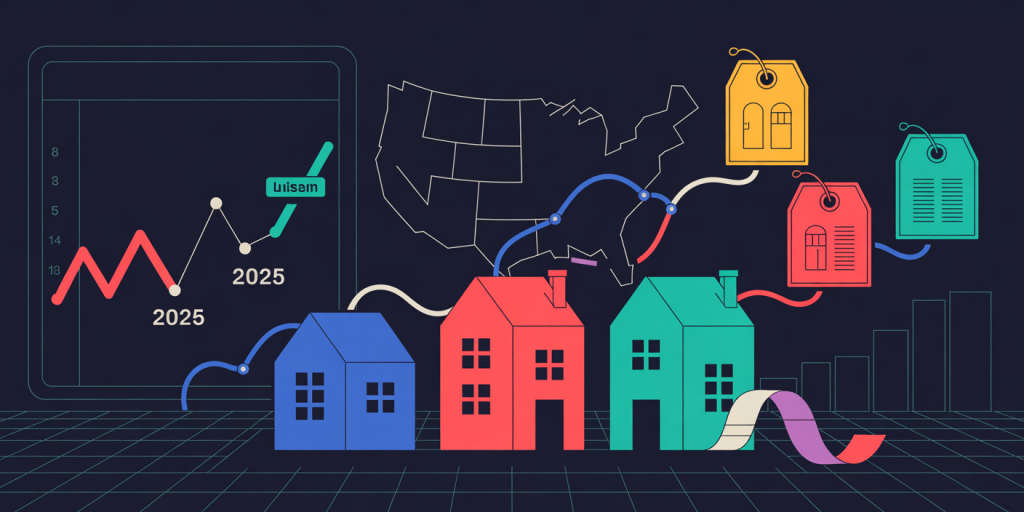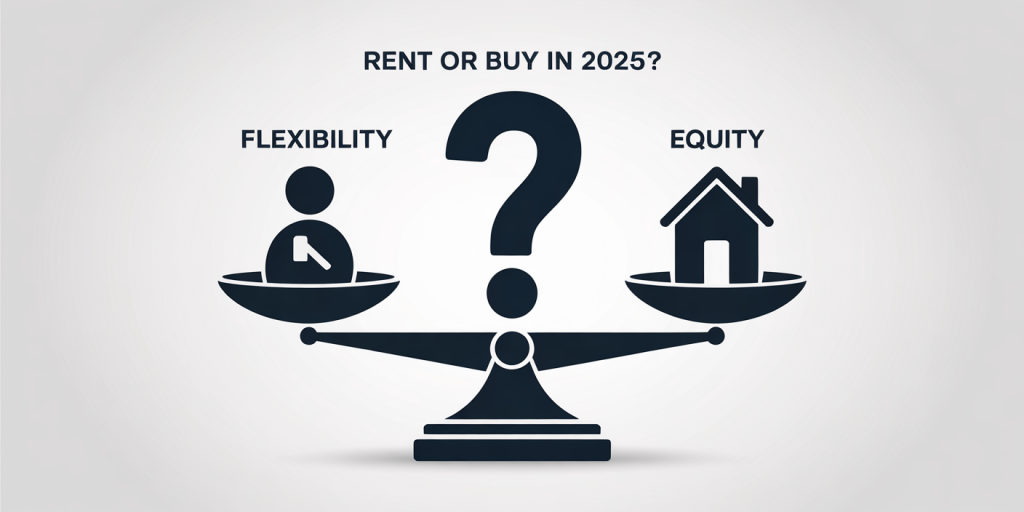Renting vs. Buying a Home: What’s Smarter in 2025?
Anúncios
In the ever-evolving landscape of real estate, the debate between renting and buying a home continues to be a pivotal financial decision in 2025. With rising interest rates, shifting housing markets, and changes in lifestyle preferences, more Americans are asking themselves: “Should I rent or buy?”
This comprehensive guide breaks down the financial pros and cons of renting and buying a home in the U.S. in 2025, factoring in updated costs, economic trends, and lifestyle considerations. Our goal is to help you make an informed decision based on logic, not emotion.
The State of the Housing Market in 2025

Anúncios
As of Q1 2025, the U.S. housing market remains competitive, but signs of stabilization are emerging in several metropolitan areas. Home prices, after years of rapid appreciation, have begun to level off due to higher mortgage interest rates, currently averaging 6.75% for a 30-year fixed loan. Rental prices, on the other hand, have risen modestly, with national averages hovering around $2,095/month for a two-bedroom apartment.
Upfront Costs: Renting vs. Buying
Renting:
Anúncios
-
Security deposit (usually one month’s rent)
-
First and last month’s rent
-
Application fees
Buying:
-
Down payment (typically 5–20% of home price)
-
Closing costs (2–5% of purchase price)
-
Appraisal and inspection fees
-
Mortgage application fees
Renting generally requires significantly less upfront capital. A renter may need $4,000–$6,000 to move in, while a buyer may need upwards of $50,000 to secure a $400,000 home with a 10% down payment and closing costs.
Monthly Expenses: The True Cost Comparison
Renting a 2-Bedroom Apartment in 2025:
-
Rent: $2,095
-
Renter’s insurance: $15
-
Total monthly cost: $2,110
Buying a $400,000 Home:
-
Mortgage (6.75% APR, 30 years): ~$2,595
-
Property taxes (1.1%/year): ~$367
-
Homeowners insurance: ~$120
-
HOA fees (if applicable): ~$200
-
Maintenance reserve: ~$200/month
-
Total monthly cost: $3,482
Verdict: Renting is currently more affordable month-to-month, especially for those without a sizable down payment or emergency fund for maintenance.
Long-Term Equity and Wealth Building
Buying a Home:
-
Builds equity over time
-
Property can appreciate in value
-
Acts as a hedge against inflation
-
Potential tax deductions (mortgage interest, property taxes)
Renting:
-
No equity accumulation
-
Rent payments benefit the landlord
-
Subject to market-driven rent increases
-
Flexibility to relocate without penalty
From a long-term wealth-building perspective, buying usually comes out ahead — but only if the homeowner stays in the property for at least 5 to 7 years.
Flexibility and Lifestyle Considerations
Renting Benefits:
-
Easier to relocate for jobs, education, or lifestyle changes
-
No responsibility for repairs or major upkeep
-
Ideal for digital nomads or those uncertain about long-term plans
Buying Benefits:
-
Stability — especially for families or retirees
-
Freedom to modify, renovate, or personalize
-
Pride of ownership and community involvement
If you’re planning to stay in the same location for less than 3 years, renting almost always makes more sense.
Risk Factors
Homeownership Risks:
-
Market downturns could lead to negative equity
-
Unexpected maintenance (e.g., $8,000 roof replacement)
-
Higher upfront financial commitment
-
Selling costs when moving (agent commissions, fees)
Renting Risks:
-
Rent hikes upon lease renewal
-
Possible eviction or non-renewal
-
No control over property improvements
-
Less stability for families
Opportunity Cost of Down Payment

One overlooked factor when buying is the opportunity cost of the down payment. For instance, investing $40,000 in a diversified index fund averaging 8% annual returns could yield $80,000+ in 10 years.
That said, real estate often appreciates at 3–5% annually, and with leverage (mortgage), gains can compound quickly.
Tax Implications in 2025
Homeowners in 2025 can still deduct:
-
Mortgage interest (up to $750,000 loan)
-
Property taxes (up to $10,000 with SALT limit)
Renters don’t receive tax breaks directly but may qualify for state/local subsidies or rent credits in certain cities (e.g., California’s Renter’s Credit).
The Impact of Mortgage Interest Rates on Buying Power
Compared to early pandemic-era rates of around 3%, today’s 6.75% rates significantly increase the cost of borrowing. For every 1% rise in interest rates, the monthly mortgage payment increases by about 10%. Buyers who could once afford a $500,000 home may now only qualify for $400,000.
As a result, many would-be buyers are forced to rent until rates drop or incomes increase.
Hidden Costs of Homeownership
Beyond the mortgage, homeowners are responsible for:
-
Repairs and maintenance (budget 1–2% of home’s value annually)
-
HOA fees
-
Furniture and appliance purchases
-
Landscaping and exterior upkeep
Renters avoid these burdens, which can significantly reduce financial stress.
Market Trends and Regional Differences
In cities like San Francisco, New York, and Seattle, renting is often more affordable due to high real estate prices. Conversely, in Charlotte, Tampa, or Phoenix, mortgage payments may match or undercut rental rates.
In 2025, remote work continues to drive growth in secondary markets with lower cost of living, making homeownership more attractive in those areas.
Psychological and Emotional Factors
Buying can bring pride, control, and emotional security. Homeowners often feel more connected to their communities.
Renting offers mental clarity. No repair surprises. No long-term commitment. No mortgage anxiety.
Choose what aligns with your personality and goals, not just your finances.
Rent vs. Buy Calculator (Example)
| Scenario | Renting | Buying |
|---|---|---|
| Monthly Cost | $2,110 | $3,482 |
| Upfront Cost | ~$5,000 | ~$50,000 |
| Equity After 5 Years | $0 | ~$75,000 (approx.) |
| Flexibility | High | Low |
| Tax Benefits | None | Yes |
| Risk Exposure | Low | Medium–High |
When Renting Is Smarter
-
You’re unsure about your job or city
-
You don’t have 6+ months of emergency savings
-
You want to avoid responsibility for maintenance
-
You plan to relocate within 3 years
-
Your credit score is below 660 (higher mortgage rates)
When Buying Is Smarter
-
You’re financially stable and plan to stay 5+ years
-
You want to build equity and stabilize housing costs
-
You qualify for a competitive mortgage rate
-
You’re buying in a growing market or undervalued area
Final Verdict

The renting vs. buying decision in 2025 is more nuanced than ever. It’s not just about money — it’s about mobility, mindset, and market timing. Renting is financially smarter in 2025 if your goals prioritize flexibility, liquidity, and lower monthly costs — especially in high-priced urban areas.
Buying, however, can be the better choice for those seeking long-term security, equity growth, and stability.
Still unsure? Talk to a financial advisor or real estate professional. And remember: renting is not throwing money away — it’s buying flexibility and freedom.

Post Comment